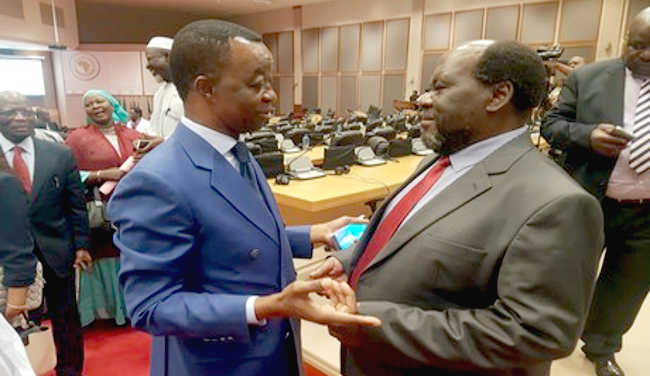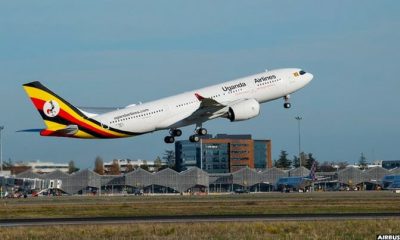News
Tax incentives big part of illicit financial flows, African MPs urged to fight them

Uganda’s PAP Representative Prof. Ogenga Latigo chats with PAP President, Roger Nkodo Dang
KIGALI, RWANDA:
Pan African Parliament legislators have been exposed to loopholes in law and exploitative trade practices of multinational companies, which are responsible for illicit financial flows in Africa. Statistics from the Organisation for Economic Cooperation and Development indicate that illicit financial flows cost Africa $50 billion per year, which is more than the total development aid the continent receives.
In his presentation to MPs on Monday about the correlation between illicit financial flows and taxation, Logan Wort, the Executive Secretary, African Tax Administration Forum cited tax incentives, unfair tax agreements, undervaluation of exports, transfer pricing, outdated laws and treaties as some of the vehicles for cash flows outside Africa.
“Why do we give tax incentives; and if we do what is the cost benefit; how are countries measuring whether the concessions we give are bringing the benefits we expect,” he said these are some of the questions that should inform any incentives given to multinationals.
Logan said the extractive sector in countries like Sierra Leone, Lesotho, Namibia and Botswana that export diamonds, have suffered huge losses from between 50 per cent to 75 per cent of their income through such practices.
He added that African countries are not getting their fair share of revenue from diamond, gold and other minerals because of undervaluation of exports by multinationals.
“Through inter company transactions, the extracting company sales the gold, copper or diamonds to a related company outside your country; that company then sales it further to another buyer at over 70 per cent more price without adding any value to the product. That product should have been sold at the last price in the first place,” he said.
The other major problem he said was the unguarded tax incentives, outdated laws and transfer pricing. Transfer pricing occurs when companies that are part of the same multinational group trade with each other.
“Transfer pricing is a legitimate method in which multinational companies do business with each other. The brewery will buy the hops, water, boxes, bottles from their subsidiary company. The prices they charge are arbitrary,” he added.
He said because countries are not able to prove, let alone see the excessive charges, interests and costs, governments end up incurring losses.
To avert illicit financial losses, legislators were urged to update and enact new laws and regulations on taxation and develop her own standards because global standards, especially in relation to taxation, are not in the interest of Africa. MPs were asked to keep their governments more accountable for the deals they make in contracts and incentives.
Prof. Ogenga Latigo one of Uganda’s five MPs sought to know what countries in Asia are doing right that countries in Africa can learn from. He said the biggest challenge in Africa is political management, noting that illicit financial flows are just symptoms of bad governance.
David Silinde, a legislator from Tanzania said in Africa people talk too much. “In 1963 when we were putting in place the Organization of African Unit (OAU), it was to make Africa our own, so we can protect our countries and her people,” he said adding “When we put in place the Pan African Parliament, it was so that it becomes a legislative organ. But it is now 14 years and countries haven’t signed the Malabo protocol which would give PAP powers to make laws.”
He said countries like Malaysia, Singapore, Indonesia, which were at one time at the same level of growth with many African countries have leapfrogged to become developed economies because of their resilience and pursuit of sound policies.
Prof. Geoffrey Lungwangwa (Zambia) observed that illicit financial flows was at the centre of the development challenge in Africa.
“Political independence without economic independence is not good for our continent. Illicit financial flows out of Africa is at the centre of economic bondage of Africa,” he told MPs.
Lungwangwa proposed that legislators need to delve deeply into the taxation policies and laws inherited from the colonial past, some of which he said are outdated. He explained that there is also need for research and development of curricula to impart training in taxation and critical monitoring of illicit financial flows.
PAP President, Roger Nkodo Dang called on parliamentarians to engage more and play an active role to broaden their country’s tax base noting that there was a clear and direct correlation between the weaknesses in tax administration systems and illicit financial flows in Africa. He said the battle against illicit trade cannot be won unless MPs play their role.
African legislators are meeting in Kigali, Rwanda, for the First Ordinary Session of the Fifth Pan African Parliament, which is premised on the African Union theme of the year 2018 “Winning the fight against corruption: a sustainable path to Africa’s transformation”. The sittings, which started on 22 October 2018 were scheduled to end on November 2, 2018. During the margins of the PAP sitting, the African Tax Administration Forum and the continental legislature signed a Memorandum of Understanding geared at strengthening tax legislation in Africa and combating illicit financial flows.
Uganda is represented at the continental legislature by five MPs, they include: Hon. Jacqueline Amongin (NRM, Ngora); Prof. Morris Ogenga-Latigo (FDC, Agago North); Hon. Anifa Bangirana Kawooya (NRM, Sembabule); Hon. Felix Okot Ogong (NRM, Dokolo South) and Hon. Babirye Kadogo (Ind. Buyende).
Comments


























